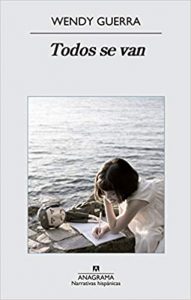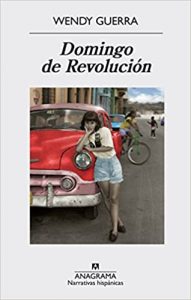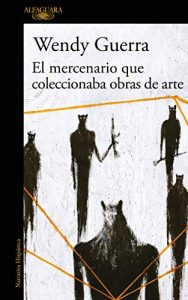In its reduced homeland, current Cuban literature is dotted with enriching contrasts. From the wayward Peter John Gutierrez but also Leonard Padura and his paradoxical crime novels with a Caribbean background or the always surprising Zoe Valdes.
In the case of Wendy Guerra we find a dual writer. On the one hand, with an almost historiographical interest, focused on the prolonged subsistence of post-revolution Cuba; and on the other hand also testifying to an always interesting feminist aspect.
And of course, the matter ends up having more of a sociological intention, of critical review, of rescuing intrahistories to end up writing novels as chronicles of that Cuba suspended in the limbo of misplaced communism, against the current. A communism still latent today, despite the announced opening, for that Caribbean country.
Then there is always the simple literature, the essence of writing with a style and towards a narrative will alien to any context. And there Wendy moves towards the absolute prominence of her characters. Vivid patterns that surround stocks exposed to the brightest light. Wendy Guerra always invites us to inhabit other skins to soak up extreme sensations. Sensations of life seen from the heights of survival, like tightrope walking.
Top 3 recommended novels by Wendy Guerra
Everyone leaves
The particular biographical avatars of the author would justify entering a fiction like this, so culled from one's own universe. But if we also add a location like Cuba, where being born meant joining a regime, the thing acquires sociological overtones whatever life it is.
Account in the form of a personal diary that covers the eight to twenty years of Snow Guerra. They all leave narrates the childhood and adolescence of its protagonist, who, from birth, travels adrift from his own life thanks to the fact that the Cuban State decides his destiny, always subject to an uncertain outcome marked by a political-social nuance .
Snow resists the hazardous life of her parents and the panic of growing up in a controlling society to the point of suffocation that takes away all her emotional possessions. Snow is a survivor, a shrewd generational protagonist of Cubans born after 1970 who need to exist in the first person from a gregarious and collective experience that leads to the island diaspora.
Todos se van is a fictional novel that recreates the childhood diary of its author, who writes in her notebook while waiting on her island for the return of her loves. It was taken to the cinema by Sergio Cabrera in 2014. The newspaper will continue ...
Revolution Sunday
It sounds strange to raise a revolution against a revolutionary state. But it is that the term "revolution" wears out before others such as "love" or even "orgasm." Because the human condition seems doomed to undercut whatever its revolution. A novel like this comes to show how deep the gap ends up being between a true revolutionary like Cleo with respect to the revolution and institutionality and a sick woman.
This is the story of Cleo, a young poet living in Havana, an author under suspicion. State Security and the Ministry of Culture believe that their success has been constructed by "the enemy" as a destabilizing weapon, an invention of the CIA.
For a certain group of intellectuals in exile, on the other hand, Cleo is, with her critical airs, an infiltrator of Cuban intelligence. Caught in this swing of musings, banned and ignored in Cuba, Cleo is the controversial but successful writer translated into several languages that shakes those who read her outside the island. His texts narrate the end of a long revolutionary process of almost sixty years.
The Sunday of an intense week of revolution that has already known two centuries. Cloistered in a beautiful mansion in El Vedado under the wonderful light of a city stopped in time, Cleo lives a sentimental adventure with a Hollywood actor at the same time that she "discovers" her parents and resists in a country that blames her for her great sin: write what you think.
While Wendy Guerra was creating this fiction in Havana, reality entered through the window, modifying the plot and intervening in it, contaminating, with its historical processes, the dramatic events that are narrated here in real time.
With this novel, Guerra is confirmed as one of the most acute and sophisticated Latin American authors in the construction of her stories. A work marked by the fine humor with which it outlines the Cuban tragedy, by the naturalness with which it describes without prejudice a reality that it knows by heart and by the sonorous language with which it evokes a city besieged by music, the sea and politics. everyday.
The Mercenary Who Collected Works of Art
There are testimonies that surpass any novelistic proposal. Wendy Guerra found the vein of a guy like Adrián Falcón, someone who gave his life to his mission, who forgot his past to get rid of everything he was.
Such transformations only occur in the cases of spies, hitmen or protected witnesses. This is the testimony, with those novelistic overtones with which memory covers the development of the events triggered after his intervention.
The charismatic mercenary who tells this story is a real character under the pseudonym of Adrián Falcón, although throughout his active years he used others such as El Parse, Hook, Strelkinov ... Tender and diabolical, Falcón is now sixty-some years old and has survived his complex life story with a peculiar sense of humor.
And it is that he was persecuted in the United States and several Latin American countries for terrorism, he was a key piece in cases as scandalous as Iran-Contra, and he operated with the Colombian cartels to finance counterrevolutionary actions. Considering himself a "freedom fighter," he acted against the leadership of the Soviet Union, Sandinismo, and Fidel Castro.
Although he was a target of the FBI at the time, he ends his combat days as a leader of the company and disbelieving in everything. Disenchantment makes him decide to fight for his destiny and find an ally in Valentina, whom he meets in Paris and with whom he begins a relationship of interests; in her own way, she is also a mercenary survivor.
This work offers a point of reference to those who wonder about the enemies faced by the Latin American left and is the product of interviews with Falcón and the review of files carried out by Wendy Guerra, daughter of guerrilla idealism who has jumped over the wall to look at in the other side.



